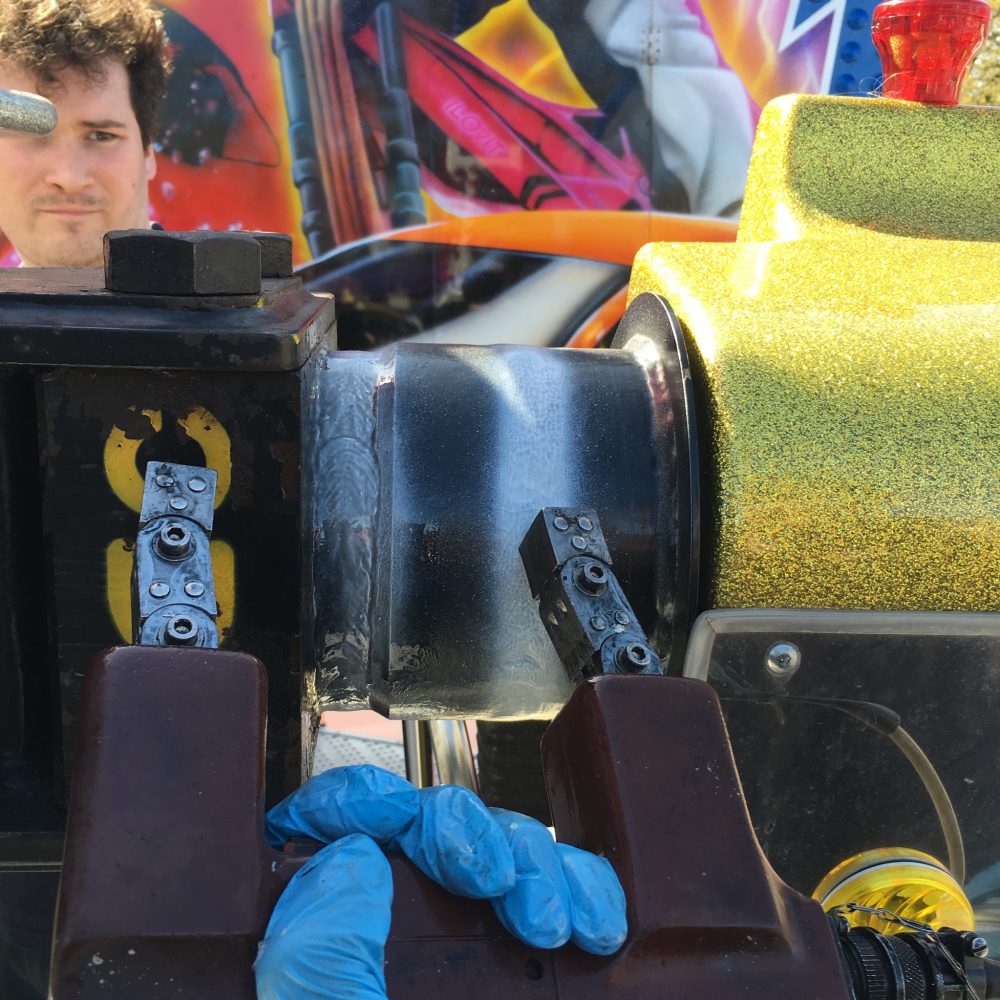Ride NDT Testing (part 2) explained
2 March 2019

Non destructive testing (NDT), know in the business as crack testing, is the process of testing for defects without damaging the components. It is a critical part of inspection to check all structural ride parts, i.e. pins, bolts, welds and corrosion. Most rides have an annual NDT inspection as part of their DOC (Declaration of Operational Compliance). A DOC can not be issued until all parts of the testing have been completed. Electrical, NDT and Ride test.
NDT Schedule
All rides are different, and so the extent and type of NDT to be performed will vary from ride to ride. Some will not need any, while others will need it in many areas using a number of different methods. Rides that need a NDT will have a schedule for testers to follow. This is normally supplied by the ride manufacturer, or generated by an Inspection Body during the ADIPS pre-use inspection process. The NDT schedule covers the parts to be tested, the frequency of the testing, the NDT methods to be used, and whether all items or a sample of them need to be tested. Ride NDT schedules may change over time as a result of information supplied by the manufacturer, HSE, the industry, or as a result of findings during previous inspections.
Different methods of testing
Visual inspection, often referred to as inspection, is a key part of testing. This requires the inspection areas to be clean and the removal of any decorative panels or lighting that may be obscuring the area. This should be part of the regular maintenance of a ride. However, there are some defects you simply cannot find without specialist equipment.
Cleaning a ride by hand helps you monitor and spot any potential defects, loose bolts, connections, hydraulic hoses oil leaks and cracks can be spotted.
Magnetic Particle (MPI) testing
This type of testing is used mainly on welds. A special white paint is used which has to be cleaned off immediately after testing to save ruining the paintwork.
Ultrasonic (UT) testing
This type of testing is used for checking pins and bolts.
Who can carry out a NDT test?
The NDT is carried out by NDT practitioners who are qualified to perform a variety of NDT methods such as magnetic particle (MPI) or ultrasonic testing (UT). The NDT practitioner may work a inspection body or it may be a separate NDT company and registered with ADIPS.
The Danter family have used Capital Inspection, a specialist Non Destructive Testing company for many years. They specialise in non destructive testing and offering both laboratory and site services.
The UKAS accredited laboratory for radiography is comprehensively equipped to meet the NDT requirements of its customers and provides its services to industries from a wide manufacturing spectrum. Based in Colnbrook, which is within minutes of the M25, M4 and M3 motorways, the laboratory is readily accessible to and from all parts of southern England.
The site services division of the company is equipped to carry out all forms of non-destructive testing anywhere in the United Kingdom. Staffed by experienced and trained personnel, the division provides its services on a contract or day to day basis and has the backing of the laboratory quality control systems and procedures. Personnel approvals to PCN in accordance with BS EN ISO 9712
Posted by William Danter on 2 March 2019













